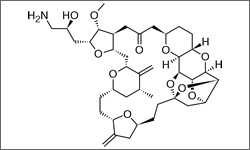Eribulin

Eribulin mesylate (Halaven®) was approved in November 2010 for the treatment of metastatic breast cancer that has been previously treated with at least one taxane and one anthracyline chemotherapy drug. The drug is given via an intravenous (IV) injection.1
- 1 Chu, E., & DeVita, V. T. (2015). Physicians' cancer chemotherapy drug manual 2015. Burlington, MA: Jones & Bartlett Learning.
Eribulin looks to cause apoptosis by inducing an irreversible mitotic blockage. Eribulin also works to limit tumor growth by disallowing the creation of microtubules through blocking of spindle formation. Eribulin also helps in the reduction of hypoxic regions by increasing blood flow to the tumor and therefore limiting abnormality and growth.1, 1
The diagram below shows the 3D molecular structure of Eribulin.
Side effects of this drug may include nausea, stomach problems, constipation, tiredness (fatigue), hair loss, decreased white blood counts (neutropenia) and pain or numbness of the hands and feet (peripheral neuropathy). The drug can lead to an abnormal heart beat. Like any drug that causes decreases in white blood counts, risk of infection may be increased.1
- 1 Chu, E., & DeVita, V. T. (2015). Physicians' cancer chemotherapy drug manual 2015. Burlington, MA: Jones & Bartlett Learning.
